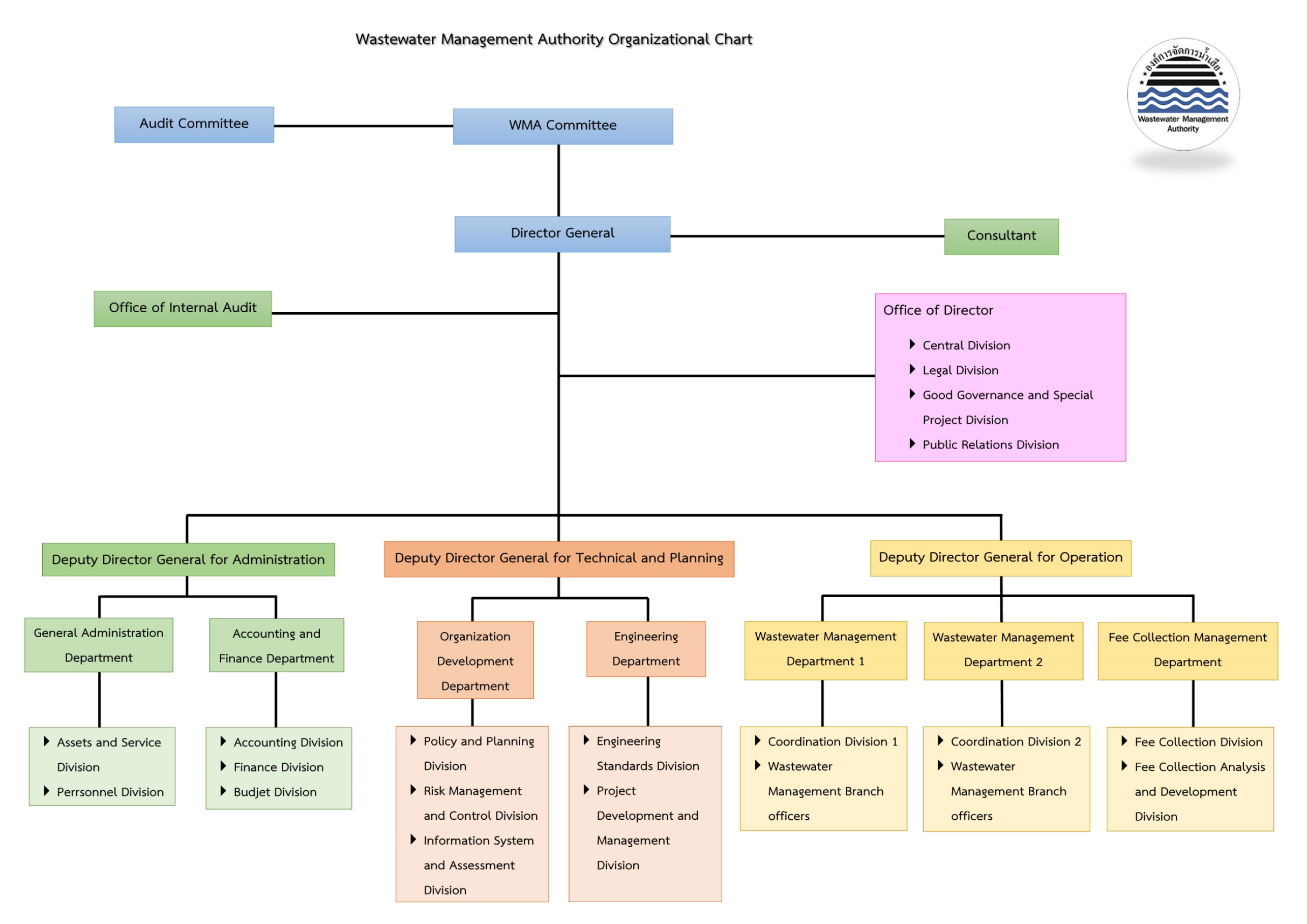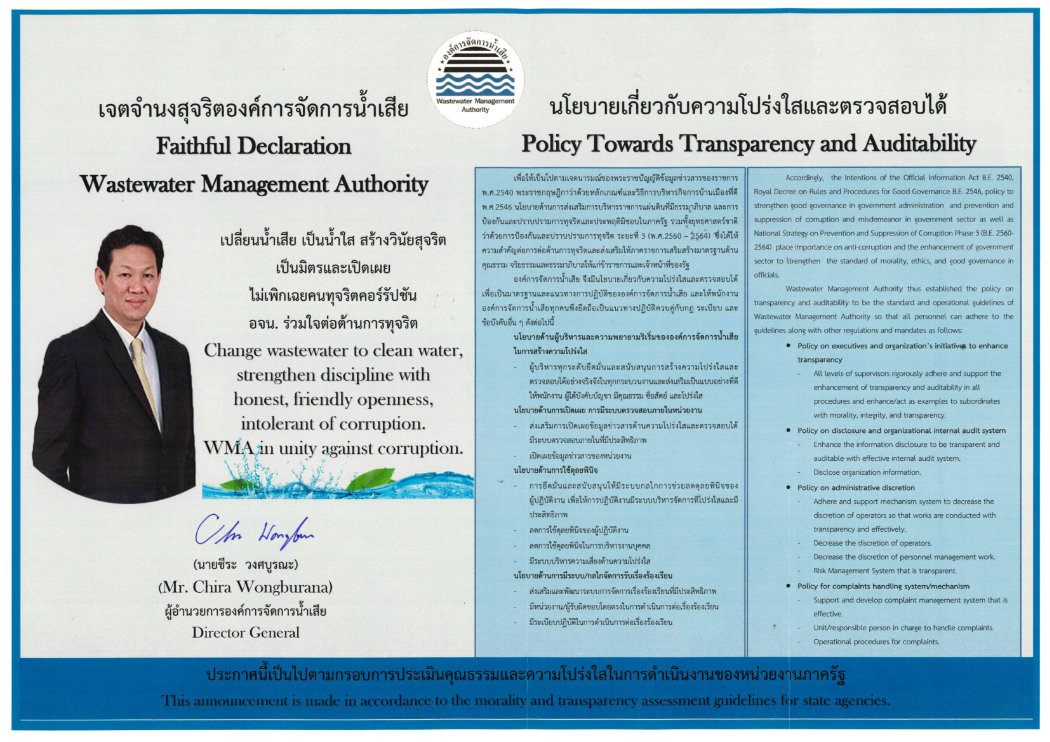Wastewater Management Authority (WMA) is a state-enterprise officially transferred from the Ministry of Natural Resources and Environment to be under the jurisdiction of the Ministry of Interior as announced in the Royal Decree Establishing the Wastewater Management Authority (No. 5) B.E. 2561 which has come into force on November 23, 2018, following its promulgation in the Government Gazette. Wastewater Management Authority was established according to the Royal Decree Establishing Wastewater Management Authority B.E. 2538 (1995) on 15th August 1995, due to the wastewater problem in the Lower Chao Phraya River Basin becoming increasingly severe and the process of wastewater treatment should be conducted continuously in compliance to the engineering and economic principles.
Thus, WMA has been established with the objectives according to the Royal Decree Establishing Wastewater Management Authority B.E. 2538 with amendments in B.E. 2540 and 2548 as seen in Section 6 (Page 4). “WMA has the objective to bring into existence a central wastewater treatment system within the wastewater management areas, and provide administrative or management services of the wastewater treatment systems, within and outside the wastewater management areas, including services or activities conducted continuously and economically in respect of efficient wastewater treatment.” The objectives also include providing services or management of the wastewater treatment systems both within and outside the wastewater management areas, so that WMA has the authority to manage existing wastewater treatment systems for local administrative organizations with efficiency.
“Wastewater Management Areas” refer to areas in Bangkok Metropolis, Nakhon Pathom Province, Nonthaburi Province, Pathum Thani Province, Samut Prakarn Province, Samut Sakhon Province, and other areas as prescribed and announced in the Government Gazette by the Cabinet according to Section 3 (Page 2).
Corporate Social Responsibility of Wastewater Management Authority Corporate Social Responsibility (CSR) refers to conducting business under ethics and good corporate governance with regards to social and environmental aspects leading to sustainable development and continuation of operational commitment as well as developments in work quality and overall quality of lives. Guidelines to the Corporate Social Responsibility of Wastewater Management Authority Wastewater Management Authority as a state-enterprise cares for the overall social quality with foresight to the operational pathways by integrating business growth and contribution to social spillover benefits. Thus, guidelines towards Corporate Social Responsibility of Wastewater Management Authority is stipulated as follows:
– State-enterprise for the public quality of life and strengthening the community with sustainability.
– State-enterprise to push forth and coordinate wastewater management works for sustained benefits and improvement in the people’s quality of lives.
Strategy 1 Integrative management of wastewater
Tactic 1 Construct and manage the wastewater treatment systems in the wastewater management areas.
Strategy 2 To increase the management capacity of wastewater treatment for Local Administrative Organizations.
Tactic 2 To rehabilitate and management of wastewater treatment systems for Local Administrative Organizations.
Tactic 3 To manage wastewater according to royal initiatives.
Tactic 4 To reuse treated wastewater.
Tactic 5 To develop financial management with stability.
Strategy 3 Develop research and innovation works in wastewater management.
Tactic 6 Develop innovation in wastewater management.
Tactic 7 Develop the organization towards being a digital organization.
Strategy 4 Manage the organization through Good Governance.
Tactic 8 To manage the organization according to good governance.
Tactic 9 Develop knowledge sharing and organization’s image.
According to the Royal Decree Establishing Wastewater Management Authority B.E. 2538 (Section 6), WMA has the objective to bring into existence a central wastewater treatment system within the wastewater management areas, and provide administrative or management services of the wastewater treatment systems, within and outside the wastewater management areas, including services or activities conducted continuously and economically in respect of efficient wastewater treatment.
During the past, WMA has not the chance to conduct works according to its objectives as set up in its Royal Decree, which is due to the country’s economic conditions and other critical problems faced at various stages. Projects involving high investments are delayed, nevertheless, WMA is committed to conducting works as a state agency to solve the country’s wastewater problems. WMA has assisted the local administration organizations in the management of wastewater treatment systems built by the central government in various areas to operate as intended with efficiency worth the investment made. Thus the country’s wastewater problem is addressed and abated at a certain degree. In addition, WMA has developed its readiness to support the works for the establishment of a centralized wastewater treatment system according to its set objectives, so that the problem is addressed and objectives achieved yielding the greatest benefits to the people. WMA has the following objectives :
1. Plan, develop, and establish the wastewater management strategies to achieve balance and sustainability, as well as to push forth the country’s wastewater management strategies to produce operating results with effective follow-up evaluation system.
2. To be the organization with high efficiency to provide news and information, build understanding in the public on wastewater management, as well as establish effective information management systems.
Wastewater is treated with quality according to the standard of the Ministry of Natural Resources and Environment totaling 329.50 million cubic meters.
– Year 2017 76.00 million cubic meters
– Year 2018 78.00 million cubic meters
– Year 2019 57.50 million cubic meters
– Year 2020 58.50 million cubic meters
– Year 2021 60.00 million cubic meters
3. Promote and disseminate knowledge and understanding in wastewater treatment to alliance network for development.
4. Increase the capacity in the management of wastewater treatment systems within and outside the areas with integration.

Wastewater Management Authority (WMA) is the state enterprise relating to public facilities which emphasizes on environmental water management for the best efficiency under the organizational management based on good governance policy. It focuses on transparency and fairness which strengthens the status of being a governmental entity. In addition, it also creates reliability and trust to all stakeholders. The good corporate governance policy of WMA focuses on major principles of responsibility and awareness of duty, equitable treatment to stakeholders, transparency, value creation, promotion and development of good governance and ethics, as well as participation. The approach of best practices includes major management in all aspects of the organization in order to correspond with the good governance policy. WMA thus declares its intention and commitment that all directors and operational officers in the organization adhere to the good governance policy as the ethics of the operation for the best benefit of the organization. This will be the factor to the operational success of the organization. Seven key principles of good governance which is the international standard and WMA adheres to them as the policy of good governance are as follows:
1. Accountability
2. Awareness of responsibility with sufficient competency and efficiency
3. Equitable treatment to stakeholders
4. Transparency
5. Value Creation
6. Promotion and development of good governance and ethics
7. Participation
1. Promote quality of lives and environment in local administrative organizaitions areas throughout the country divided into 3 parts as follows:
1.1 Critical river basin areas comprising Lower Chao Phraya River Basin and Lower Tha-Chin River Basin.
1.2 Municipal wastewater treatment systems throughout the country of Local Administrative Organizatons areas in 101 places.
1.3 To solve the environmental degradation problem that hampers the livelihood of the people living in nearby areas of the Projects Under Royal Initiatives.
2. Support the solving of critical drought and water insufficiency problems according to the government policies by developing suitable methods in water reclamation which reduces the effluent discharged into natural water reservoirs and public waterways, as well as enhance the potential and opportunity in water accessibility with efficiency.
3. Develop the organization and personnel capacity to become a learning organization correlating to good governance.
4. Enhance the image of Wastewater Management Authority, strengthen the Corporate Social Responsibility together with network building in public participation in operating areas.
5. Conserver the water sources environment and people’s health in daily living.
6. Amend laws, regulations, and orders relating to duties of Wastewater Management Authority to be suitable and can be implemented according to the vision, missions and objectives of Wastewater Management Authority.
7. Support the research and innovation on wastewater management to lay the long term development foundation to strive towards becoming the organization with stability, prosperity, and sustainability according to the government policy of Thailand 4.0”

พระราชกฤษฎีกาจัดตั้งองค์การจัดการน้ำเสีย
องค์การจัดการน้ำเสีย (Wastewater Management Authority: WMA) เป็นรัฐวิสาหกิจ สังกัดกระทรวงมหาดไทย จังตั้งขึ้นตามพระราชกฤษฎีจัดตั้งองค์การจัดการน้ำเสีย เมื่อวันที่ ๑๕ สิงหาคม ๒๕๓๘ ด้วยเล็งเห็นว่า ปัญหาน้ำเสีย ในพื้นที่ลุ่มน้ำเจ้าพระยาตอนล่างได้ทวีความรุนแรงและมีความเสื่อมโทรมมากขึ้น ประกอบกับการแก้ไขปัญหาต้องมีการดำเนินงานอย่างต่อเนื่อง อีกทั้งในการจัดการน้ำเสียอยู่ในความรับผิดชอบของหลายหน่วยงาน ขาดการบูรณาการ การแก้ไขอย่างเป็นรูปธรรมและไม่มีความเป็นเอกภาพ ดังนั้น การจัดตั้งองค์การจัดการน้ำเสีย จึงมีวัตถุประสงค์เพื่อเป็นองค์กรดำเนินการจัดให้มีระบบบำบัดน้ำเสียรวมสำหรับการบำบัดน้ำเสียในเขตพื้นที่จัดการน้ำเสีย รวมทั้งบริการหรือกิจการต่อเนื่องที่เกี่ยวกับการจัดการน้ำเสียอย่างมีประสิทธิภาพเชิงพาณิชย์